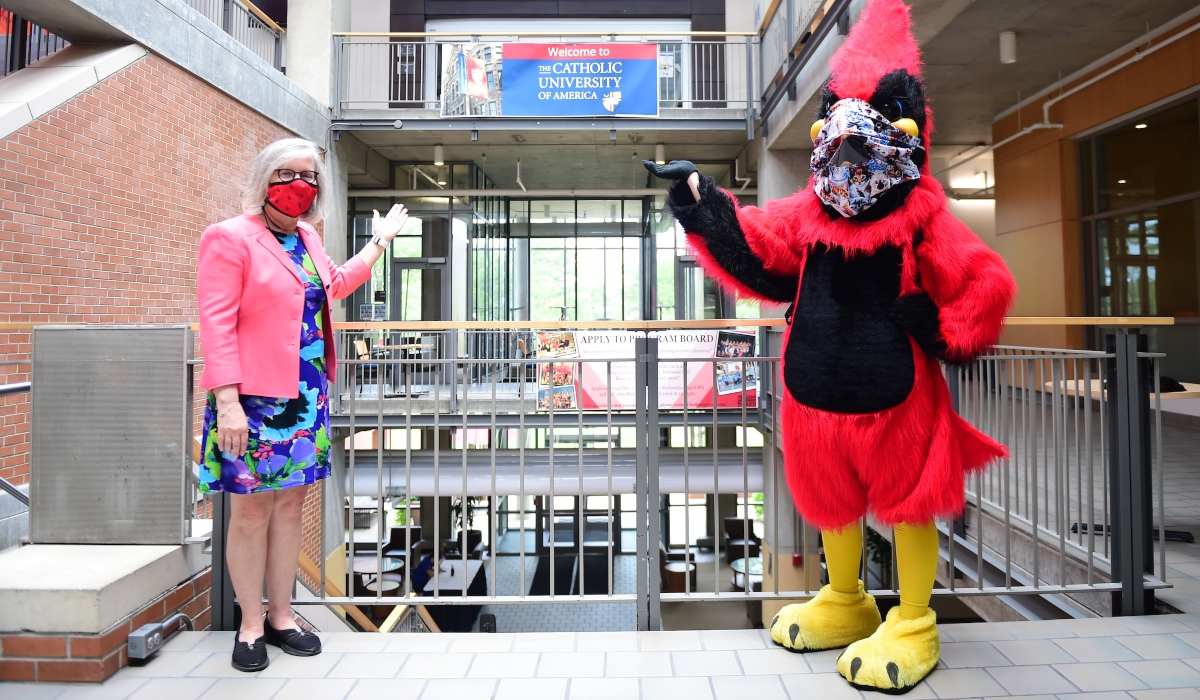

The University has contracted with Ascension Healthcare through Providence Health Services to host a COVID-19 testing site on campus for students. It is available for all students, whether they live on campus or off campus.
Students who experience a fever or other symptoms of COVID-19 should call Student Health Services. A healthcare professional will discuss their symptoms with them, and may schedule them for testing.
The testing facility will be located in Millennium North and will be staffed by three Ascension employees. The testing center is up and running and available to students returning to campus.
To assist in identifying students who require testing, all students attending in-person classes in the fall or residing in the Washington, D.C., area will need to complete a short health survey each day. They will be prompted via text each morning. Students who are experiencing COVID-like symptoms should contact Student Health Services for a medical assessment.
"In order to ensure the safety of everyone on campus, we're asking students to be especially mindful of any symptoms of illness at this time,” says Dr. Loretta Staudt, director of Student Health Services. “If you are experiencing any symptoms, please remain in your residence and check in with Health Services staff."
Students who test positive or are presumed positive based on symptoms or close contacts will be required to isolate. “Isolation is when we separate someone we know is sick or infected from those that are not ill,” Dr. Staudt clarifies.
The University is designating Millennium South to serve as isolation space to house and care for residential students. Each apartment’s kitchen will be filled with a supply of “comfort foods” to supplement meals that will be delivered.
Student Health Services staff will monitor patients isolated with COVID-19 via virtual appointments at least once a day. If a Student Health Services provider determines that a student with COVID-19 requires more advanced care or is unable to care for themselves, the provider will ensure that the student is transferred to a local health care facility.
In order to minimize student contact, the University has decided that only freshmen and new transfer students (with a few exceptions) are being allowed to return to residence halls this fall. All students will reside in single rooms within suites or apartment units with private unit bathrooms. Each suite/apartment will be considered a “family unit” should quarantine or isolation be necessary.
Additionally, the University will not permit external visitors in its residence halls during the fall 2020 semester.
From Monday, Aug. 17, through Sunday, Sept. 6, all students at Catholic University will be quarantined in order to comply with the District of Columbia mandate for those students arriving from high risk areas. In order to maximize the effectiveness of the quarantine and support the health and safety for everyone on campus, the University decided it best to require all students to quarantine. This will provide the very best conditions for the start of the fall semester.
The difference between isolation and quarantine is that, “quarantine is when we ask individuals that may have been exposed to an ill person, to limit their activities and be very mindful of CDC recommendations,” Dr. Staudt says. “This is to prevent them from possibly spreading the illness during the incubation period, before they may even have symptoms.”
During this time, non-resident students should not visit campus (except for those who have meal plans who should only come to pick up their meals as they are directed).
Campus facilities including the library, computer labs, and Pryzbyla Center will be closed to student visitors until Tuesday, Sept. 8. Any student who becomes ill during that time should contact Student Health Services (202-319-5744) to schedule a visit. Health Services will only be accepting patients who call ahead for screening.
“The entire University community is working together to balance the health and safety of our students while also providing a positive on-campus student experience,” says Judi Biggs Garbuio, vice president for Student Affairs.